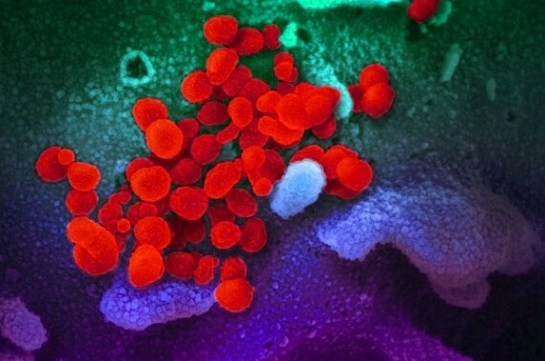Hidden Immune Protein Blocks Vital Antiviral Response in Severe COVID-19 Patients
Nikhil Prasad Fact checked by:Thailand Medical News Team May 13, 2025 9 months, 1 week, 4 days, 21 hours, 20 minutes ago
Medical News: Scientists Uncover How a Single Immune Molecule Weakens the Body’s Defenses in Severe COVID-19 Cases
A new study by researchers in Greece has uncovered a surprising culprit behind the poor immune response seen in patients with severe or critical COVID-19. A molecule called CD55, which is normally involved in regulating inflammation, appears to suppress the body’s ability to produce key antiviral proteins known as type-I interferons. This newly discovered mechanism could explain why some COVID-19 patients become seriously ill, despite having the same virus as those with milder symptoms.
 Hidden Immune Protein Blocks Vital Antiviral Response in Severe COVID-19 Patients
Hidden Immune Protein Blocks Vital Antiviral Response in Severe COVID-19 Patients
The research team included scientists from the First Department of Critical Care Medicine and Pulmonary Services at Evangelismos Hospital and the National and Kapodistrian University of Athens, as well as the Institute for Bioinnovation at the Biomedical Sciences Research Center “Alexander Fleming” and the Department of Immunology and Histocompatibility at Evangelismos General Hospital. This
Medical News report delves into their groundbreaking findings, which open the door to potential new treatments for COVID-19.
CD55 Shown to Disrupt Body’s Natural Antiviral Signaling
The study involved single-cell RNA sequencing (scRNA-seq) and flow cytometry analysis of blood samples from patients with mild, severe, and critical COVID-19, as well as healthy individuals. The scientists found that the protein CD55 was significantly increased in immune cells—particularly T cells, B cells, and monocytes—in patients who were severely or critically ill. This upregulation was not seen in mild cases.
Normally, CD55 helps regulate the complement system, a part of the immune system that helps fight infections and removes dead cells. But in this case, the excessive presence of CD55 seemed to block the activation of interferon-stimulated genes (ISGs), which play a critical role in early antiviral defense. Patients with high levels of CD55 had notably lower levels of ISG activity.
Laboratory Experiments Confirm the Inhibitory Role of CD55
To test their theory, the researchers silenced the CD55 gene in T cells from severely ill patients and then exposed these cells to SARS-CoV-2 viral peptides. Remarkably, the previously suppressed antiviral genes bounced back into action. Six key ISGs, including IFI6, IFI27, and ISG15, were significantly reactivated, even exceeding levels found in healthy control cells. This result directly linked CD55 to the suppression of the type-I interferon response.
The researchers noted that this suppressive effect happened across multiple types of immune cells, including monocytes and B cells. The findings were consistent across patient samples infected with different SARS-CoV-2 variants such as Alpha, Delta, and Omicron, suggesting that CD55’s impact on immune suppression is not limited to one specific viral strain.
A New Target for
Future COVID-19 Treatments
The study’s results highlight CD55 not only as a marker for disease severity but also as a possible target for therapy. By blocking or reducing CD55 activity in immune cells, it may be possible to restore the body’s natural antiviral defenses and help patients fight off the virus more effectively.
According to the researchers, their findings point to a “novel mechanistic role” for CD55 in the progression of COVID-19. They also emphasized the importance of further studies to explore how CD55 interacts with other immune pathways and whether existing drugs can safely modulate its activity in critically ill patients.
Conclusion
This study uncovers a key piece of the puzzle in understanding why COVID-19 can be so devastating in some individuals. By identifying CD55 as a suppressor of the type-I interferon response, scientists have revealed how the virus may exploit the body’s own regulatory mechanisms to evade immune attack. These insights could lead to the development of targeted therapies that block CD55, helping to boost the immune response in vulnerable patients and reduce the severity of disease. As the world continues to grapple with COVID-19 and its long-term effects, this discovery offers a promising new direction for treatment research.
The study findings were published in the peer reviewed journal: Communications Biology
https://link.springer.com/article/10.1038/s42003-025-08066-z
For the latest COVID-19 News, keep on logging to Thailand
Medical News.
Read Also:
https://www.thailandmedical.news/news/sustained-effects-of-sars-cov-2-spike-protein-on-human-endothelial-cells
https://www.thailandmedical.news/news/study-finds-that-60-percent-of-covid-19-patients-have-elevated-blood-glucose-levels
https://www.thailandmedical.news/news/covid-19-alters-brain-blood-flow
https://www.thailandmedical.news/news/covid-19-news-the-phytochemicals-tannic-acid-and-rosmarinic-acid-are-able-to-target-the-main-protease-and-aak1-in-sars-cov-2
https://www.thailandmedical.news/articles/coronavirus
https://www.thailandmedical.news/pages/thailand_doctors_listings
